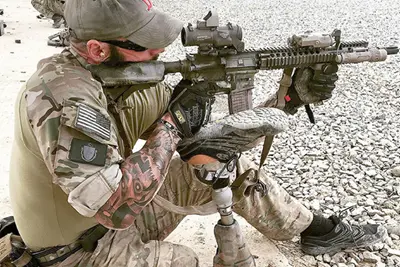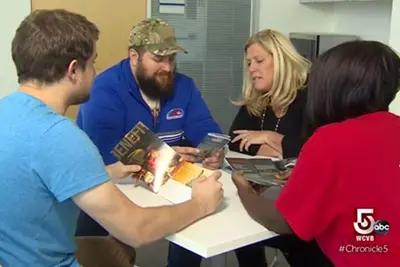Patton Veterans Project Helps Reduce the Stress of Service through Film
 Image by Tory Wesnofske
Image by Tory Wesnofske
Filmmaker Ben Patton, left, shows the editing ropes to veterans, including sophomore Marine veteran Brandon Thompson, right.
11/07/2017
By David Perry
Brandon Thompson has seen too many Marine buddies die. One was too many, but he counts a half-dozen guys with whom he served.
Thompson, a UML sophomore business major, served stateside from 2007 to 2012, but he’s witnessed the carnage wreaked by demons that follow combat veterans home from the battlefield.
After leaving the Marines, Thompson moved to Lowell with a buddy from his unit. His friend died of a drug overdose two years ago.
“I tried to help him, but he was using drugs to deal with PTSD,” Thompson says. Others from his unit have suffered similar fates. “You hear it a lot.”
In an effort to help process those experiences, Thompson spent a recent weekend on campus immersed in moviemaking. He learned about camera angles, editing and shooting the narrative of his real-life story, or a symbolic part of it.
He was participating in the “I Was There” film workshop, run by the Patton Veterans Project, a program that brings veterans together for a crash course in filmmaking and a chance to bond with fellow veterans. It’s a weekend that can change lives, says Benjamin Patton, the program’s executive director.
“(Ben’s approach) empowers the vets and enables them to tell their own stories. It gives them control of their experience, rather than the experience controlling them.” -Director of Veterans Services Janine WertHe says it helps veterans re-integrate into civilian life and understand their experiences. It can also bring veterans like Thompson out of the shadows.
“This has been really good,” Thompson says of the program. “Fun, even. For me, with no family around, it’s been about trying to build connections.”
A Military Legacy
Though he’s not a veteran, Patton knows a thing or two about military culture. The military was, after all, the family business. His father was a U.S. Army general, a veteran of the Korean and Vietnam wars. His grandfather was “Old Blood and Guts,” George S. Patton, the famed World War II general.
Early on, Patton dreamed of joining the Navy. He was accepted to the U.S. Naval Academy. But at 17, doubt crept in.
“It just felt like, in my family, you need to go into that arena all in, like an NFL linebacker,” Patton recalls. “I couldn’t. But I’m very happy with the path I took. I feel like I’m serving, in my own way.”
An author and filmmaker, Patton launched the Patton Veterans Project in 2011 with the idea that storytelling through film could be not just beneficial, but even therapeutic for veterans. He has since hosted more than 40 workshops at military bases, veterans hospitals, universities and private clinics both in the U.S. and Israel, giving nearly 1,000 veterans the tools to work together on more than 300 films.
“I observed that a lot of veterans would come into these workshops isolated, uncertain. No real expectations. But if you put them in a room with filmmakers and other vets, they can create a narrative, and it can be powerful. You can show your spouse, your daughter, your parents, what your life was like – without showing them Polaroids of blown-up bodies. This is different.”
 Image by Tory Wesnofske
Image by Tory Wesnofske
The process of putting veterans in a room with filmmakers, he says, “counters isolation with a process that is inherently collaborative.”
Patton approached UMass Lowell about hosting a weekend workshop, mainly for its large student-veteran population and the support they get.
“There are 1,200 student veterans, so UMass Lowell has a great population coming back and transitioning out of the military,” says Patton, whose family hails from Massachusetts.
The program is also part of a Department of Veterans Affairs research study to evaluate the effectiveness of using filmmaking to help veterans with post-traumatic stress disorder.
“This is the first time we’ve partnered with anybody for research,” says Janine Wert, UML’s director of Veterans Services. “Ben’s is a nontraditional approach to address the issues returning combat veterans may face, and it’s really promising. It empowers the vets and enables them to tell their own stories. It gives them control of their experience, rather than the experience controlling them.”
Wert says veterans face unique challenges as they settle into student life.
“Yes, we see PTSD, but the most common thing we deal with is just plain transition. We ask soldiers to make a 180-degree transition into a culture that’s pretty much opposite to what they live in the military,” she says.
The three-day workshop was held at University Crossing and attracted about a dozen veterans. Patton and a couple of film professionals schooled the veterans from the technical aspects of film production to the art of narrative storytelling. He showed them how to edit and how to tell their story.
Chris Borden ’94 was among the veterans who attended. A fine arts graduate who also studied film at New York University, Borden served in the U.S. Air Force and is an Army reservist. He has worked everything from military police to meteorology to his current job, civil affairs, which he says seems to best suit him.
He’s been shot at, heard the thud of rocket-propelled grenades, breathed the sands of Afghanistan, documented bad things with his camera and worked to make tense situations better with his gentle charm.
“Do I have some PTSD? Probably. It seems impossible not to after some of that,” he says.
 Image by Tory Wesnofske
Image by Tory Wesnofske
Among Borden’s collaborators at the workshop was Tom Schmidt ’16, who works as a money manager in Boston. Schmidt served with the Marines from 2007 to 2013. During his first semester at UMass Lowell, he kept to himself.
“All I did was go to my classes, go home and not really talk to anyone.” He credits Wert and the Veterans Services office with “getting me out, going to veteran’s events.”
Schmidt and Borden worked on a short film they called “Isolated Connections,” which has a theme of loneliness and disconnection among veterans.
“It’s not exactly as I first expected,” says Schmidt of the workshop. “As you work, it becomes how you relate to and understand different people, through your own story.”
At a previous workshop, Army National Guard veteran Janina Rios did her own film, “Serenity,” about letting go of trauma, including struggles from her service. She volunteers with Patton’s crew.
“It changed me,” she says of her filmmaking experience. And she sees a similar transformation in her fellow veterans who participate in the workshop.
“The veterans are able to open up. You’re with a group of veterans, so you feel safety. Now, it brings me great joy to do anything I can to help others.”
Organizers are planning a public screening of the films on campus in early December.





